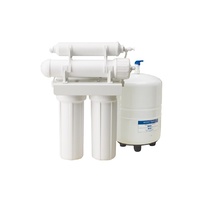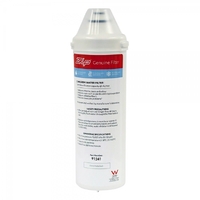Reverse Osmosis Water Filter Systems

Reverse Osmosis (RO) Systems are renowned for producing high-quality water, a necessity in medical, dental, healthcare, laboratory and pharmaceutical sectors.
Originating in the 1960s for recycling wastewater in spacecraft, reverse osmosis in Australia has since evolved into a premier technology for generating pure water free from dissolved impurities.
Now, RO water filter systems have gained widespread popularity in both private and commercial sectors. They are favoured in Australia and globally for their efficiency and effectiveness in water filtration.
An RO water system operates by using a pump to push inlet water across a semipermeable membrane. Applying back pressure, water molecules are forced through the membrane, leaving almost all dissolved salts behind. This process results in a highly concentrated stream of waste water, which is directed to the drain. The flow over the membrane surface of an RO water system ensures impurities are continuously washed away, preventing scaling.
Some reverse osmosis water filter systems incorporate a feature that allows a portion of this concentrated wastewater to be recycled with new feed water. This recycling is often employed in various applications to achieve a more favourable ratio of pure to waste water, enhancing efficiency and saving water.
FAQs
Reverse osmosis systems are highly effective at removing a wide range of contaminants from water. They ensure safer, cleaner drinking water by forcing water through a semipermeable membrane, trapping contaminants on one side and allowing clean water to pass through.
Here's a breakdown of what a reverse osmosis water filter in Australia typically filters out:
- Total Dissolved Solids (TDS): This encompasses a wide range of minerals and salts like calcium, magnesium, and sodium. RO systems reduce TDS levels, which can affect the taste and hardness of water.
- Fluoride: RO systems remove around 95% of fluoride, a common additive in Australian mains water. The remaining fluoride is comparable to fluoride levels naturally found in rivers and lakes.,
- Heavy Metals: Includes lead, mercury, cadmium, arsenic, and chromium. These metals can be harmful to health even in small quantities and are efficiently removed by reverse osmosis systems.
- Viruses and Bacteria: RO membranes are fine enough to filter out microorganisms like cryptosporidium, giardia, norovirus, hepatitis A, and E. coli, providing an additional layer of safety against waterborne diseases. Additional filtration or disinfection is always recommended if there is known microbiological contamination.
- Microplastics: These tiny plastic particles, often found in tap and bottled water, are filtered out due to the RO system's fine membrane.
- Pesticides and Herbicides: Agricultural chemicals, which can seep into water sources, are significantly reduced.
- Chemicals: RO effectively removes or reduces trace amounts of PFAS, VOCs and pharmaceuticals which can be found in mains water & bore water supplies. Chlorine is removed by the carbon pre filter found in most RO systems.
A residential or commercial reverse osmosis system offers several significant advantages, making it a preferred choice for many households and businesses:
- Improved Taste and Smell of Water: Reverse osmosis systems remove contaminants that can cause unpleasant odours and tastes This results in water that is fresher and more pleasant to drink.
- Reduced Exposure to Harmful Contaminants: By filtering out substances like lead, mercury, and arsenic, RO water significantly lowers the risk of consuming these potentially harmful elements, which is particularly beneficial in areas where water quality may be compromised.
- Healthier Drinking Water: The removal of bacteria, viruses and parasites through reverse osmosis systems provides an extra layer of protection against waterborne illnesses, ensuring the water is safe and healthy for consumption.
- More Convenient than Buying Bottled Water: Having an RO system at home or in a business setting eliminates the need for regularly purchasing bottled water, saving time and effort.
- Eco-Friendly Option: Using a reverse osmosis water filter reduces the reliance on plastic water bottles, which helps in cutting down plastic waste and carbon footprint associated with the production and transportation of bottled water.










